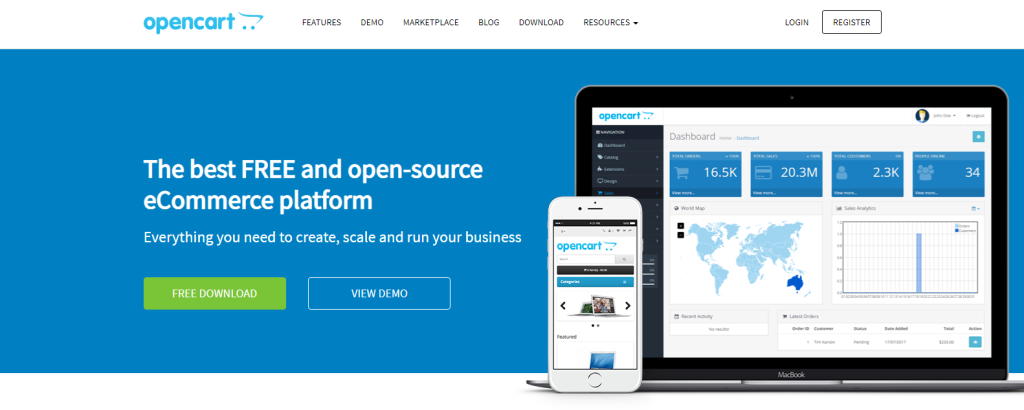E-commerce websites have become an integral part of the modern web. In the internet era, people are willing to buy anything online and have no problem buying products or services from an e-commerce website. Therefore, the success of any business depends on its ability to establish a good e-commerce website that can attract customers and earn profit in return.
Now definitely, you are thinking about CMS. What is CMS? And what is the role of CMS in an e-commerce website?
Let’s get started with CMS!
What is CMS?

CMS stands for Content Management System. If you’re a web developer or designer, the term probably sounds familiar; it’s something that many people in those fields use daily. But if you aren’t yet in the know, let us break it down for you: CMS is simply software that allows you to manage the content of your website. That’s it!
If we haven’t made this clear yet, CMS isn’t some magical beast—it’s simply a tool designed to make life easier for people with websites. In fact, most modern websites rely on a content management system (CMS) because they’re so helpful at helping keep your site’s information organized and accessible from anywhere on your site. In addition, a content management system (CMS) enables multiple people within an organization – designers, developers, and clients – to access and modify their own sections without learning how HTML functions first-hand. This eliminates the need to update every page manually each time something changes (if even just one thing changes which could take years). It also makes updating pages faster overall since there won’t be as much manual work involved when making edits or adding new content directly into each individual file itself; instead, all these tasks can be done via one user interface, which streamlines everything dramatically!
Agencies that Using CMS
Many agencies are using CMS nowadays. Here’s a list of some of them:
Benefits of a CMS for Businesses

A CMS helps you manage your content. For instance, it will be easier to manage and update your website if it contains a large amount of content.
A CMS helps you manage your brand. If there’s one thing businesses need to do, it is protecting their brand image and reputation as much as possible—particularly when it comes to digital marketing efforts like websites and social media platforms.
A CMS’s built-in analytics tools can help you manage your marketing initiatives more successfully by determining how many people are visiting the website, what pages they find most helpful or entertaining (or not), etc. In addition, this allows for displaying relevant ads when someone comes from a search engine result page on various platforms (SERP).
Lastly, having a user-friendly CMS can help you save money by reducing your time manually modifying material. The user only needs to select an item before making any changes by clicking “edit” next to each individual entry with all previous information still available in case anything happens later on, that needs updating. Everything is already prepared in advance within sections such as “pages” or “menus,” where users only need to select an item before making any changes by clicking “edit” next to each individual entry.
Here are the Top 6 CMS for eCommerce Websites
1. Shopify

Shopify is a powerful e-commerce platform that enables you to sell online. Using a drag-and-drop editor and simple point-and-click functionality helps you build and manage your store, check out customers as they shop, and gather feedback from them to improve your business.
It is an excellent all-around solution that can be utilized by users of various levels of expertise. So this is the option for you if you’re seeking a way to swiftly and effortlessly set up an online store.
It has various features, such as;
- Shopify provides a function called Point of Sale that enables businesses to sell their goods in physical stores. For instance, companies can set up physical stores to sell their goods to customers face-to-face and take payments using a card reader. This application is available from Shopify in two versions: Shopify POS Lite and Shopify POS Pro.
- The success of any online business depends on search engine optimization (SEO), which raises a website’s search engine rating. Smart SEO program is available in the Shopify App Store and offers a wide range of features, including automated metadata input, the supply of structured data to Google and other search engines, support for numerous languages, and many more.
- Shopify offers several tools that let businesses communicate with billions of wholesale suppliers globally.
2. WordPress

WordPress You may have heard about WordPress in the past, but
did you know that it powers over 28% of the entire internet? That’s almost 1/4th of the whole internet.
It is also the most used CMS for online stores, so if you’re looking for a comprehensive solution for your online store, this is the right one for you. This comes with lots of benefits, such as a large community, so you can get help and advice whenever you need it, thousands of plugins and themes to choose from, so you can customize your site to your exact specifications, and more. It’s a great option if you’re looking for a simple but effective solution.
It is an open-source CMS tool using PHP and MySQL. Its features include a plugin structure and model system. It is more related to blogging but supports different types of network content, including more conventional mailing lists, forums, and media galleries.
3. Magento

Magento is a mighty CMS, and it’s used by several big
brands, such as Nike, Urban Outfitters, and many more. It is a great all-around solution and can be used by people of all skill levels.
It has various features, such as;
- With the Magento CMS, sophisticated SEO tools and integrated analytics are accessible.
- Due to its excellent scalability, you can quickly increase or decrease the server’s resource needs in response to traffic.
- Using Magento is easy and convenient for both browsing and managing catalogs.
4. OpenCart

OpenCart has been around for a while and has proven itself
a worthy contender in the eCommerce CMS world. It’s a great all-around solution and can be used by people of all skill levels. It has various features, such as;
- In OpenCart, many users with different roles and rights can be created. They can even be separated into groups and specific users.
- Multiple shops can be operated from a single interface.
- Additionally, OpenCart allows users to build affiliate networks to market products.
5. WooCommerce

A WordPress e-commerce plugin called WooCommerce is free and open source. It powers more than 30% of all online stores, making it the most widely used e-commerce platform on the internet.
Here are some features you need to know;
- You can sell anything using WooCommerce, from standard physical products and services to members-only digital content.
- Free and paid extensions are available on the official WooCommerce marketplace to enhance your store’s features and functionality.
6. PrestaShop

PrestaShop is a free, open-source e-commerce solution with a large, active developer community. It offers a large selection of plugins for customizing your website and is easy to use. In addition, it supports many languages, payment gateways, and several other features. PrestaShop claims that its technology is used by over 300,000 e-businesses worldwide.
Here are some features that you need to know.
- The combinations generator lets you create products with variants based on attributes.
- Additionally, it adds categories and subcategories.
- It can also modify your store.
- Show the entire product page with a call to action buttons, cross-selling, and marketing material.
- It also lowers the rate of cart abandonment by sending emails.
Conclusion:
CMS is the backbone of any website and is an integral part of an e-commerce business. These websites have become so popular because they offer you complete control over how your site looks and functions without hiring someone else to do it for you. Although numerous CMS choices are available, we’ve chosen six that stand out from the rest: Shopify, WordPress, Magento, WooCommerce, PrestaShop, and OpenCart.

Leave a Reply